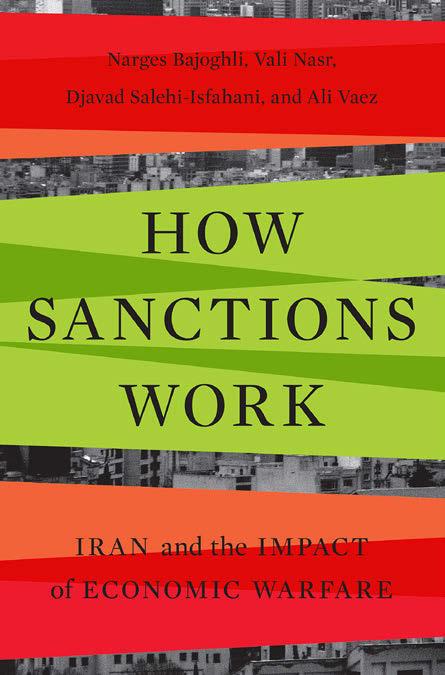How Sanctions Backfire
Reason magazine
|April 2025
IF THERE’S ONE part of foreign policy where President Donald Trump has been consistent, it’s economic sanctions on Iran.

During his first presidency, Trump imposed what the State Department called a “super-maximum economic pressure campaign.” Throughout the Biden administration, Trump and his supporters complained that Iran had been on the verge of bankruptcy but lax sanctions enforcement was allowing the Iranian economy to rebound. In his third week in office, Trump signed an order calling for renewed sanctions pressure on Iran, although he also expressed willingness to negotiate.
Sanctions have undoubtedly made Iran squirm. Iranian oil exports fell to nearly nothing in 2019, leading Iran to harass oil shipping and allegedly attack oil production in neighboring countries. The government couldn’t even access its own money abroad, and it had to make complex deals to buy food and medicine. At home, Iran saw increasingly widespread uprisings and crackdowns in 2018, 2019, and 2022. Figures in Trump’s orbit have flirted with the idea of full-on regime change.
The way sanctions deal out damage—the chain of causation from the president’s pen to turmoil in Iran—is less well understood. Even if the issue weren’t muddled by heavy propaganda, the process is complicated. How Sanctions Work: Iran and the Impact of Economic Warfare presents an easily digestible set of data on sanctions. It’s written by anthropologist Narges Bajoghli, economist and former Central Bank of Iran researcher Djavad Salehi-Isfahani, and political scientists Vali Nasr and Ali Vaez, both of whom have advised the U.S. government on negotiations.
The past few decades in Iran have been a natural experiment in the effect of economic sanctions. Iran has more of a market economy than other targets of U.S. sanctions, such as Cuba and North Korea. It also had normal trade relations with much of the world, which have been cut since the 1990s by waves of Washington’s sanctions.
This story is from the April 2025 edition of Reason magazine.
Subscribe to Magzter GOLD to access thousands of curated premium stories, and 10,000+ magazines and newspapers.
Already a subscriber? Sign In
MORE STORIES FROM Reason magazine

Reason magazine
Does AI Know How You Will Die?
HOW HIGH IS your risk of developing pancreatic cancer or suffering a heart attack in the next 20 years? A new generative artificial intelligence system called Delphi-2M aims to answer that question and offer personalized forecasts of your long-term health trajectory.
1 mins
February/March 2026
Reason magazine
SOUTH PARK
The animated TV comedy South Park continues to do the impossible: stay punchy and relevant after decades on the air. The latest five-episode season, streaming on Paramount+, once again follows the fourth-graders of South Park Elementary as they navigate a world increasingly obsessed with technology and everything political.
1 min
February/March 2026

Reason magazine
WILL MAMDANI DEFUND THE POLICE?
THE NEW MAYOR IS KEEPING POLICE COMMISSIONER JESSICA TISCH ON THE JOB, BUT THEY MIGHT HAVE A CONTENTIOUS RELATIONSHIP.
3 mins
February/March 2026

Reason magazine
MAMDANI'S EDUCATION AGENDA FOR LESS LEARNING
NEW YORK SCHOOLS NEED MORE CHOICE AND BETTER CURRICULA, BUT THE CITY'S NEW MAYOR WANTS TO TAKE CHOICES AWAY.
8 mins
February/March 2026
Reason magazine
THE TWO FACES OF ZOHRAN MAMDANI
MAMDANI ACTUALLY WANTS MORE HOUSING TO BE BUILT.
3 mins
February/March 2026

Reason magazine
The Long Road Home
The Wounded Generation examines the aftermath of the “good war.”
5 mins
February/March 2026

Reason magazine
How the FCC Became the Speech Police
THE CONSTITUTIONALLY ANOMALOUS STATUS OF BROADCASTING INVITES GOVERNMENT MEDDLING.
21 mins
February/March 2026

Reason magazine
MAMDANI CAN'T RAISE YOUR KIDS
THE MORE THE GOVERNMENT INTERVENES IN THE MARKET, THE MORE NEW YORK PARENTS PAY FOR CHILD CARE.
10 mins
February/March 2026

Reason magazine
Ayn Rand, the Video Game
\"WHAT DOES COMPLETELY, COMPLETELY UNREGULATED COMMERCE LOOK LIKE?\" KEN LEVINE'S BIOSHOCK WILL TELL YOU.
14 mins
February/March 2026
Reason magazine
DEATH BY LIGHTNING
Mike Makowsky opens Death by Lightning, a four-part miniseries he wrote and produced, with a chilling line: “This is a true story about two men the world forgot. One was the 20th president of the United States. The other shot him.” Yet this drama about President James Garfield and assassin Charles Guiteau reminds us that we should wish for more forgettable presidents.
1 min
February/March 2026
Listen
Translate
Change font size
